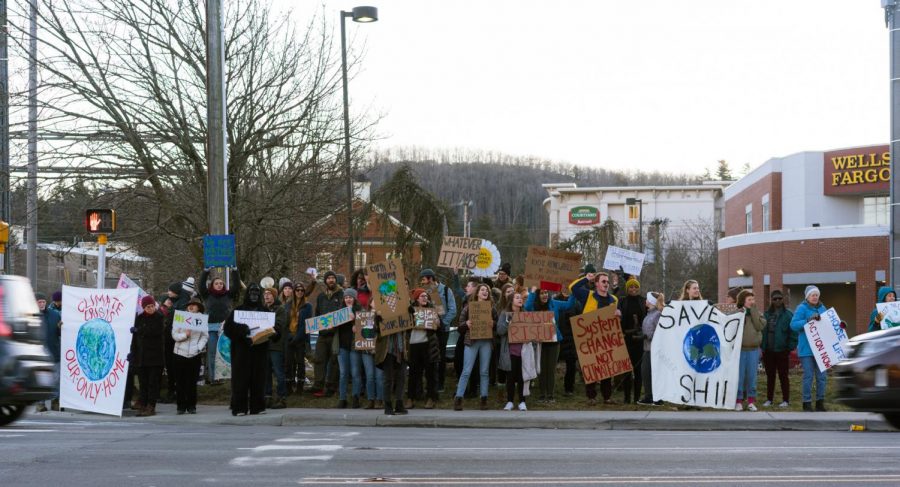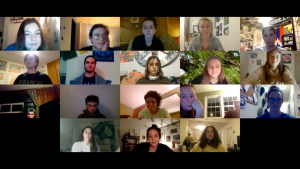“We will no longer be ignored”: Climate Action Collaborative beckons board of trustees for immediate climate justice
Members of the Climate Action Collaborative chant and hold signs during their parade on Blowing Rock Road toward Highway 105 January 19, 2019.
April 28, 2021
The Climate Action Collaborative, a local climate justice and environmental advocacy group, sent a list of demands to the App State Board of Trustees, calling on them to take bold and immediate action to resolve the climate crisis.
“We are writing to inform you that we will no longer be ignored,” ClimACT wrote in the email. “The question is whether you are willing to listen, strive, innovate and push.”
Neither the university nor Board of Trustees have responded to ClimACT. The group also sent their demands to the UNC System president and North Carolina state senators and representatives.
A petition to show support for the demands has garnered almost 1,200 signatures.
“We recognize that these demands are incredibly ambitious,” said Michael Weiss, a ClimACT organizer. “At the same time, we recognize that, in proportion to the issue at hand, they make total sense and are totally possible.”
The demands are:
- Establish a climate action committee by fall 2021.
ClimACT is demanding that the Board of Trustees establish a climate action committee, consisting of students, faculty and staff, to oversee their goals.
The committee will assess climate-related risks to the university, establish a plan for climate neutrality by 2025, ensure support for marginalized communities, facilitate climate action, monitor progress and establish accountability mechanisms.
“The vision for an integrated committee with students, faculty, staff and administrators is to address the fact that it’s an intersectional issue,” said Caroline Comer, another ClimACT organizer. “The integrated committee would allow us all to be in a space together.”
ClimACT also wants to establish an “internal carbon pricing program,” a market-based approach to addressing climate change. This program would put a limit on the amount of carbon each university department is allowed to emit through its operations. These decisions would be overseen by the proposed climate action committee.
- Redirect $100 million a year toward sustainable goods and local, minority and women-owned businesses.
ClimACT argues that App State’s purchases, including goods and contracted services, should be governed by “social and environmental conditions.” Right now, Weiss said, App State purchases are not guided by any ethical or sustainable principles.
“That money could have the power to revitalize the local economy, help local farmers and small businesses, also minority owned and women owned businesses,” Weiss said. “We could really prioritize uplifting those communities.”
By establishing an “environmental and socially preferable purchasing plan,” ClimACT argues App State can purchase goods and services that are more sustainable and support marginalized communities.
- Commit to purchasing 100% renewable energy for the university by 2022.
App State, and many members of the community, get their power from New River Light and Power, which is also owned by App State.
ClimACT is calling on the university to purchase exclusively renewable energy, as opposed to energy coming from non-renewable means like fossil fuels, by 2022 when NRLP enters a new energy contract.
“ASU could just say ‘Give me 100% renewable energy,’” Weiss said.
Moreover, they are calling on NRLP to exclusively purchase and provide renewably sourced energy by 2025 and take necessary action to reduce the costs for customers as much as possible.
Part of this includes weatherizing 75% of all the homes, apartments and businesses in their area of coverage, directly around App State, by 2035. Weatherizing a building means making physical adjustments so it can better withstand the natural elements, which will reduce energy consumption.
- Reinvest $50 million toward sustainable infrastructure.
Similar to their purchasing plan, Weiss said that App State does not have an ethical or sustainable framework for how they invest their endowment and other unrestricted funds.
“We need to have principles and ethics and sustainability,” Weiss said. “We’re a public university, we can’t just prioritize financial growth over everything.”
Weiss said it is fair to assume that App State is investing in “unsustainable, extractive” companies because of the profitability in those industries and their performance on the stock market.
In this demand, ClimACT implores the university to instead invest this money into sustainable infrastructure, like solar and better roads, at App State. They also propose investing in community development financial institutions, nonprofits that fund distressed communities across the country.
“There’s ways that we can invest in the health and well-being of people and of the planet while also making App great,” Weiss said. “We can’t just prioritize financial growth over everything.”















